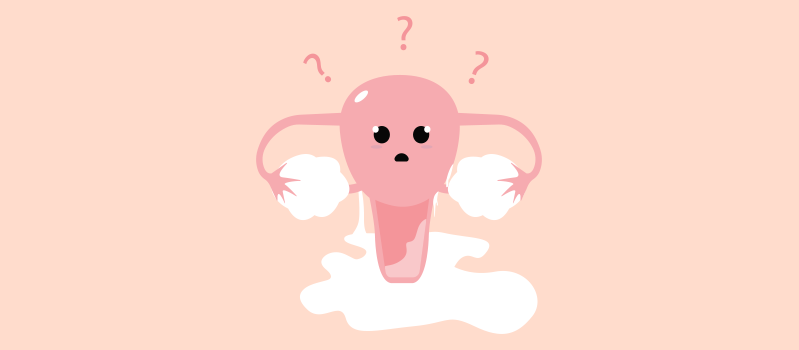What’s the Buzz
The Bee Healthy Blog
9 Symptoms of a Ruptured Ovarian Cyst

An ovarian cyst is a fluid-filled sac that forms in the ovaries during the menstrual cycle. Most ovarian cysts do not cause any problems or pose any health risks and usually go away on their own. However, sometimes, an ovarian cyst can rupture (burst open), causing symptoms and needing treatment. Please continue reading to find out the symptoms and treatment options for a ruptured cyst in the ovary.
What are ovarian cysts?
The ovaries are a pair of organs in the pelvis. One of the ovaries releases an egg once a month during the ovulatory phase of the cycle. The egg makes its way through the fallopian tubes to the uterus. The ovaries also make hormones estrogen and progesterone.
A small, fluid-filled sac called an ovarian cyst can develop in the ovaries for different reasons. Risk factors for ovarian cysts include pregnancy, hormonal problems, endometriosis, severe pelvic infection, and a history of ovarian cysts in the past.
Many ovarian cysts are harmless and disappear on their own without causing any symptoms. Those that don’t go away are called functional ovarian cysts. If a functional cyst develops but does not release an egg and continues growing, it is called a follicular cyst. If a functional cyst releases an egg and continues growing, it is called a corpus luteum cyst.
Functional cysts do not pose any health risks and usually go away in a couple of menstrual cycles. Certain other types of cysts, such as dermoid cysts, endometriomas, and cystadenomas, are not related to the menstrual cycle and can cause health complications, including ovarian torsion (twisting of the ovary on itself), which can cause less blood flow to the ovary.
What causes ruptured ovarian cysts?
Sometimes, an ovarian cyst can rupture (break open) and cause symptoms. Experts don’t know why some ovarian cysts rupture and others do not. An ovarian cyst is more likely to rupture during vigorous physical activity, including vaginal sex. Women who have a health condition or take medications that make them bleed easily are more likely to need surgery for a ruptured ovarian cyst due to uncontrolled bleeding.
What does it feel like when an ovarian cyst ruptures?
Signs and symptoms of a ruptured ovarian cyst include sudden and severe pelvic pain or lower abdominal pain accompanied by fever and vomiting. Ruptured cysts can also cause cold and clammy skin, a rapid heart rate, rapid breathing, lightheadedness, weakness, and low blood pressure.
How do doctors diagnose a ruptured ovarian cyst?
Doctors can diagnose ruptured ovarian cysts based on medical history, symptoms, physical exam, pelvic exam, vaginal or abdominal ultrasound, blood tests, urine test, pregnancy test, vaginal culture (to check for a pelvic infection), and CT scan.
What is the treatment for a ruptured ovarian cyst?
Treatment for a ruptured ovarian cyst depends on the symptoms. Most ruptured ovarian cysts do not cause any symptoms or cause only mild symptoms. They can be managed with medical treatment consisting of pain medicines and keeping track of your symptoms.
However, sometimes, a ruptured cyst causes more severe symptoms, including extreme pain and bleeding. A complex ruptured ovarian cyst has mixed fluid and solid areas and is more likely to cause severe symptoms. You may need care in the hospital for a complex cyst that has ruptured, including intravenous fluids, careful monitoring of your vital signs and red blood cell level, and follow-up ultrasound tests to check for internal bleeding. You may also need a blood transfusion to have blood replaced if you have had a lot of internal bleeding.
Sometimes, surgery is required for a ruptured ovarian cyst. This may be an emergency surgery. It can be done with a minimally invasive method (laparoscopic approach), which requires small cuts, or a traditional open surgery (laparotomy approach), which requires a larger incision to remove the ruptured cyst or the entire ovary. Surgery carries risks such as bleeding, infection, incision not healing well, blood clots, risks of anesthesia, injury to nearby structures, and scar tissue formation.
How long do ovarian cyst rupture symptoms last?
The sharp pain from an ovarian cyst rupture should get better in a few days with pain medication. Tell your doctor without delay if you continue to have pelvic pain or abdominal pain that is not controlled with pain medicine or develop other symptoms.
What can be mistaken for ovarian cyst rupture?
Other conditions that can cause similar symptoms as a ruptured ovarian cyst include ectopic pregnancy, appendicitis, and kidney stone. Doctors can make a proper diagnosis based on the results of imaging or blood tests.
How to prevent ovarian cysts?
You can’t do anything to prevent ovarian cysts. You can, however, make sure you get regular pelvic exams so that any changes in your ovaries are diagnosed and monitored. Also, make a note of any unusual symptoms or changes in your monthly cycle and talk to your healthcare provider if the symptoms continue for more than two or three cycles.
Hormonal contraceptives, such as birth control pills, can stop ovulation and prevent the formation of multiple cysts. But birth control pills cannot shrink an ovarian cyst that has already developed.
When should you go to the ER for an ovarian cyst?
You should go to the ER for an ovarian cyst if you have severe pain (sharp belly pain that comes on suddenly), fever, vomiting, weakness, dizziness, fainting, cold and clammy skin, fast breathing, fast heartbeat, or low blood pressure.
References:

SOCIAL